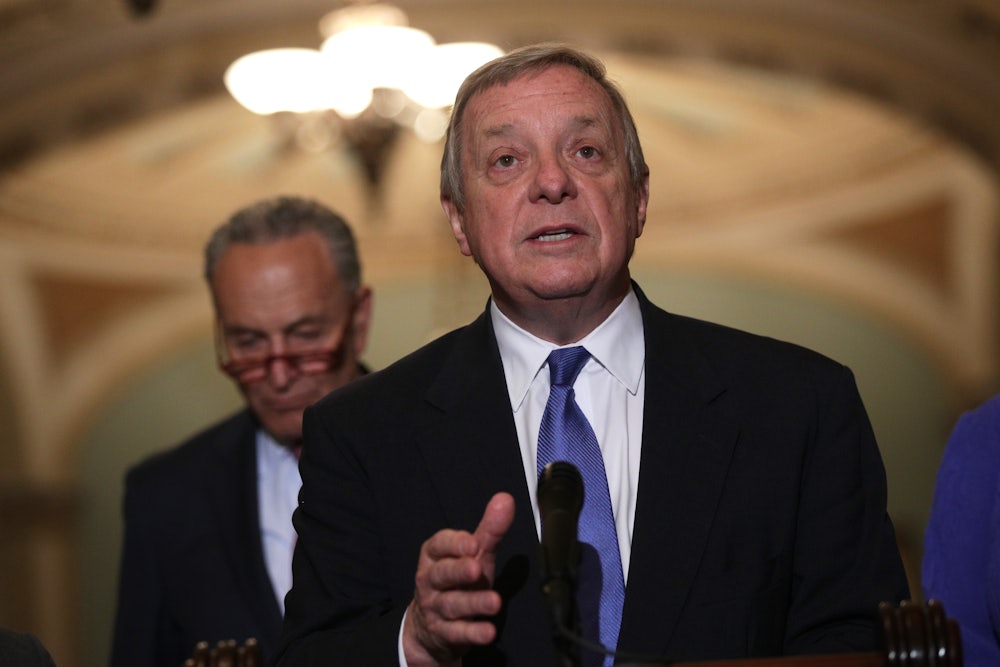Republicans blocked efforts to temporarily name a replacement to the Senate Judiciary Committee while Senator Dianne Feinstein is recuperating from shingles, a blow for Democrats as they seek to confirm judges to the federal bench. Senator Lindsey Graham, the Republican ranking member of the committee, objected to Senate Majority Leader Chuck Schumer’s unanimous consent request, setting up a more challenging vote on the issue.
“When someone as dear and accomplished as Senator Feinstein asks us for something so important to her, we ought to respect it,” Schumer said, referring to Feinstein’s request that she be temporarily replaced last week.
Those words failed to garner the sympathies of Republicans. Congressional Democrats have been concerned that Feinstein’s absence from the Senate will make it difficult to confirm President Joe Biden’s judicial nomination at a time when abortion rights cases and elements of the president’s agenda are being challenged in federal courts. Feinstein, who has not set a date for when she will return to Washington, had asked for a temporary replacement to be installed on the Judiciary Committee in her stead—a request that had little historical precedent.
It also had little chance of success, given the need to bring Republicans on board to facilitate the temporary swap. Now that they have blocked the seating of a replacement, Democrats worry that Biden’s judicial nominations could be held up indefinitely. Without Feinstein present, the committee is evenly divided, and Democrats will be unable to advance judicial nominees unless they have bipartisan support.
“Do the math,” Senate Judiciary Committee Chair Dick Durbin told reporters on Monday. “I don’t have a majority if she’s not here.” Durbin told me on Tuesday that Feinstein’s absence would also affect “legislation as well as nominations.”
On Tuesday, Schumer told reporters that he planned to tap Senator Ben Cardin as Feinstein’s temporary replacement. Republicans objected to a request for unanimous consent to seat Feinstein’s temporary replacement on the Judiciary Committee, forcing Democrats to instead attempt to muster 60 votes. It was immediately unclear whether 10 Republicans would join all Democrats in voting to do so. “Senate Republicans will not take part in sidelining a temporary absent colleague off a committee just so Democrats can force through their very worst nominees,” Senate Minority Leader Mitch McConnell said on Tuesday.
In his remarks objecting to Schumer’s request, Graham argued that “this is about a handful of judges that [Democrats] can’t get the votes for.” “I understand that you won the election, we lost, and I want to make sure we process judges fairly,” Graham said. “But the reason this is being made is to try to change the numbers on the committee in a way that I think would be harmful to the Senate.”
The politics of confirmation is the sticking point. Senate Democrats have pursued an aggressive agenda of confirming Biden’s judicial nominees, hoping to counteract the conservative reshaping of the federal bench that occurred when President Donald Trump held the White House and Republicans controlled the Senate. Biden was already lagging behind Trump in overall judicial confirmations: Although Biden has seen more than 100 of his judicial appointments confirmed, Trump had confirmed 234 judges by the end of his term, a number that the current president is unlikely to meet. (Trump also saw three Supreme Court justices confirmed during his term, granting the court the solidly conservative majority necessary to overturn the Roe v. Wade ruling.)
“It slows down some of the business of the committee to not have a functioning majority,” Senator Sheldon Whitehouse, a Democratic member of the Judiciary Committee, told me on Tuesday.
Representative Ro Khanna, a Democrat from California who has called on Feinstein to resign, argued that a functional Judiciary Committee is needed to counter the “assault on women’s rights.” “We have judges who are going rogue and taking away access to an abortion pill based on bad science,” Khanna told reporters on Tuesday, referring to a federal judge’s ruling last week on the abortion medication mifepristone. “The biggest response we can have, other than having term limits for Supreme Court justices, is to have people [who] actually follow the Constitution and are in touch with the modern life on the Judiciary. And that means getting as many [nominees] through now.”
Progressives outside of Congress are also concerned about the ramification of Feinstein’s absence. Zack Gima, the vice president of strategic engagement at the American Constitution Society, observed in a statement that only one nominee has been voted out of the committee since February 9. “As of today, there are 12 nominees awaiting votes, with a few more eligible after today’s hearing. Several of these nominees have been waiting weeks to be voted out of committee and will continue to wait so long as Senator Feinstein’s seat remains empty,” Gima said. “If Senator Feinstein’s necessary absences continue to prevent the work of [the Senate Judiciary Committee] and, in turn, the Senate, she should step down. And that decision should come soon if she can’t return.”
In the previous Congress, the Senate had established rules for bringing nominations to the Senate floor when a committee was deadlocked, due to the even division of the chamber. But those rules expired at the beginning of January, when the new Senate was seated and Democrats gained a 51-seat majority.
Josh Chafetz, a professor at Georgetown Law, argued that Feinstein’s absence would not be detrimental to the work of processing Biden’s judicial nominations in the immediate term. He noted that there are currently 19 judicial nominations awaiting a vote by the full Senate. Chafetz predicted that the Senate would be processing between two and four judges on the Senate floor per week at most, meaning that it may be some time before new judicial nominations will need to be considered.
“There’s a number of weeks before her absence would start to have any impact on the actual confirmation pace, especially because [the Judiciary Committee] has continued to hold hearings in her absence,” Chafetz said. “I’m not saying that there’s no scenario in the future in which it comes to have a significant impact on the pace of judicial confirmations. But we’re still a number of weeks out.”
When asked whether the Senate could focus on addressing those nominations that are pending on the Senate floor, Whitehouse noted that “time on the Senate floor is always a precious commodity.” “We may need to dedicate a bit more time to that project,” he continued.
But some Democrats on the Judiciary Committee have insisted that the work of the committee has not been dramatically affected, and said that Feinstein could return imminently. “Obviously we’re a narrow committee, but my focus right now is on doing what we can do and praying for her health and well-being,” Senator Cory Booker said. Schumer told reporters that Feinstein would be returning “soon,” although he did not name a specific date.
Another Democrat on the committee, Senator Richard Blumenthal, highlighted the hearing on nominations that the committee held on Tuesday morning as evidence that “we’re moving ahead.” “I’m hopeful that Republicans will assist us either in replacing or voting out of committee the nominations that are under consideration,” Blumenthal continued.
But Republicans have condemned Democrats for wanting to temporarily replace the senator—even though she herself requested it. Senator Josh Hawley, a Republican member of the Judiciary Committee, told me on Tuesday that he believed Feinstein was a “legend,” and argued that Democrats were trying to push her out, although no Democratic senator has called on her to resign. “The congressman from her own state gave the game away,” Hawley said, referring to Khanna. “I think that this is a maneuver designed to fail.”
Republicans have also argued that Feinstein’s absence has not significantly hindered the committee. McConnell said on Tuesday that the situation “has really not ground the Judiciary Committee to a halt.”
Hawley acknowledged the complexity of the situation for Democrats. “I’m sure there’s plenty of stuff to vote on, but it’s probably a matter of what [Durbin] wants to vote on,” he said. “I’m sure he’s frustrated by it.”
With Republican opposition to naming certain and Senate Democrats unwilling to outright call for Feinstein to resign, the best option for the majority may be to wait out Feinstein’s absence. “My hope is that it will be a very short-term challenge, because Senator Feinstein will be back soon,” Blumenthal said.










